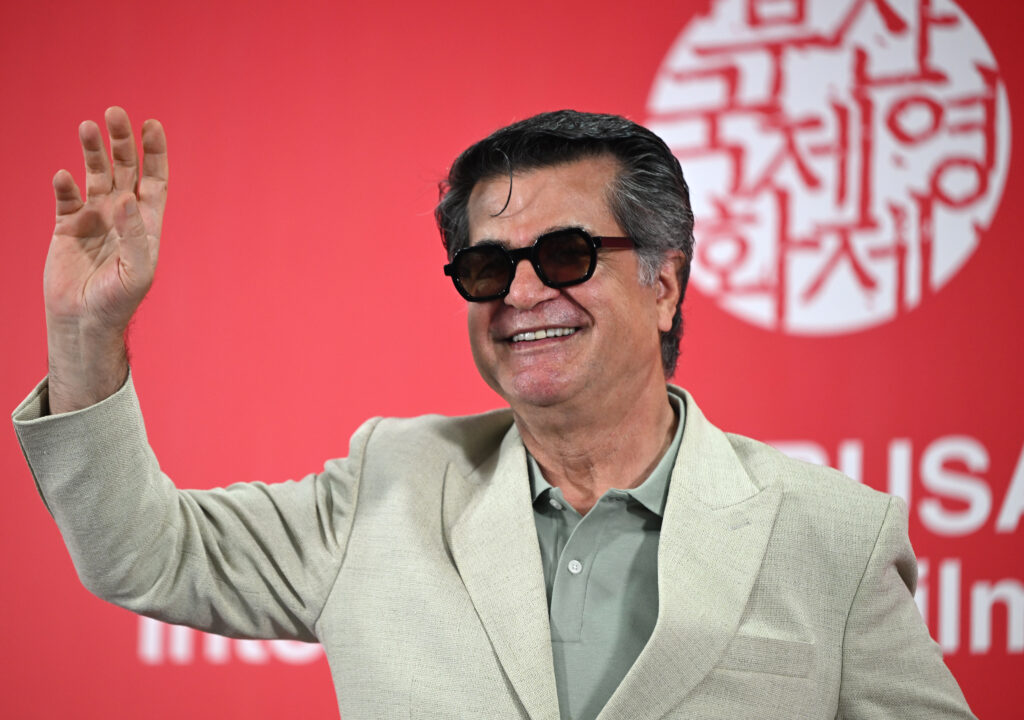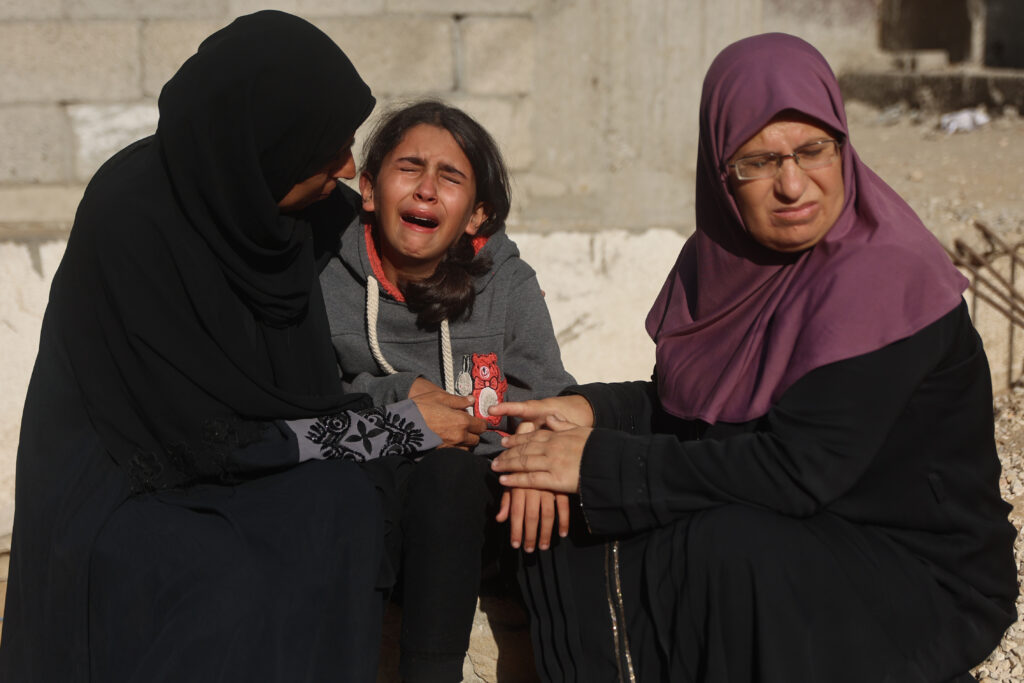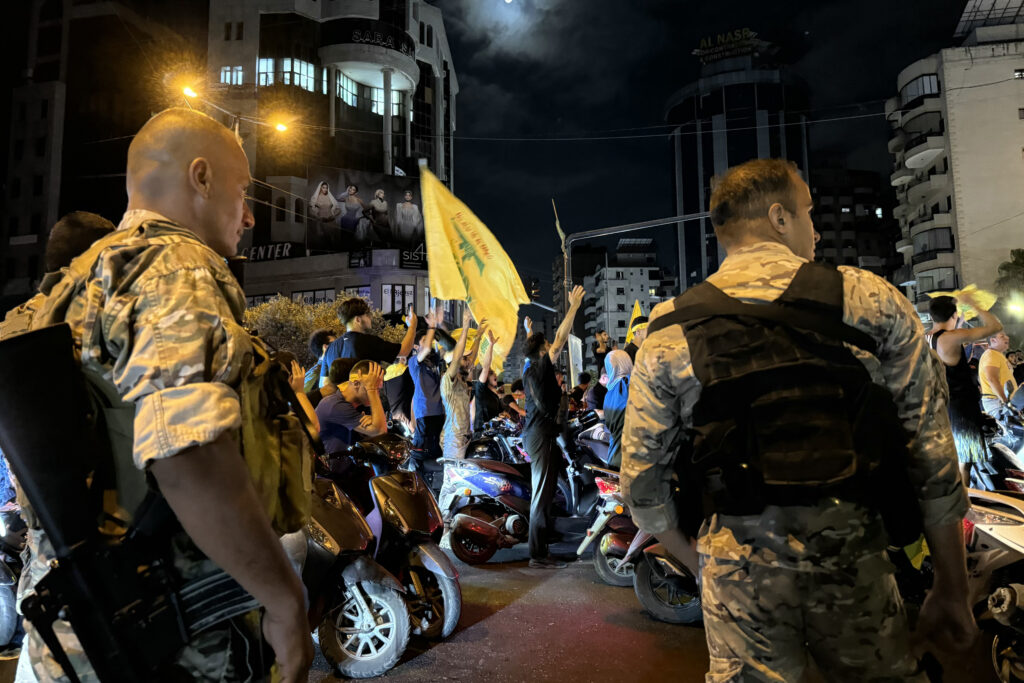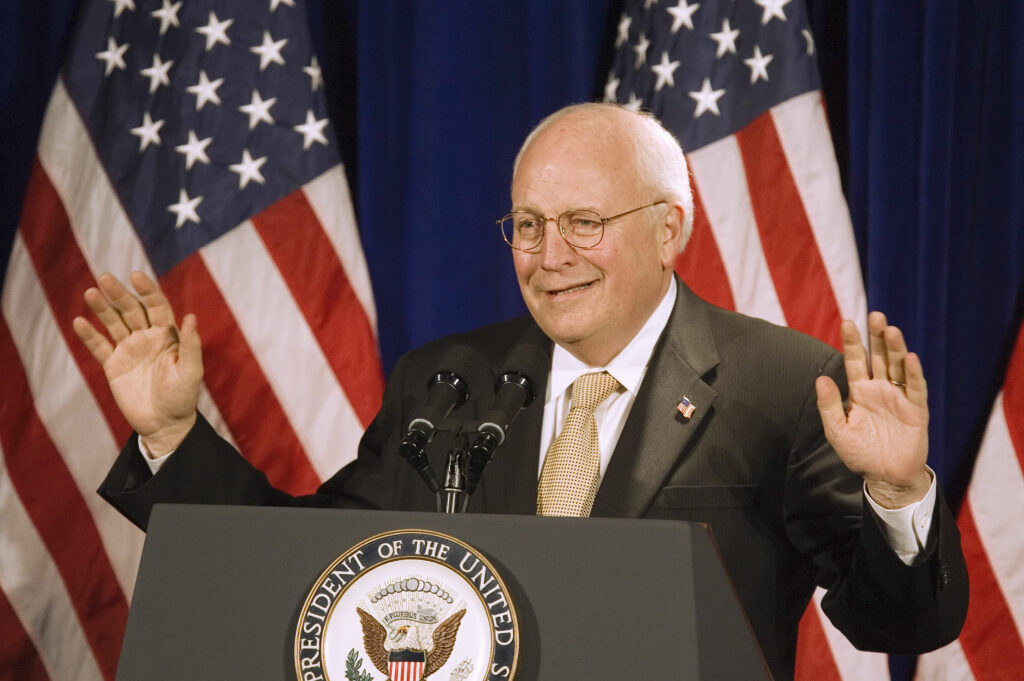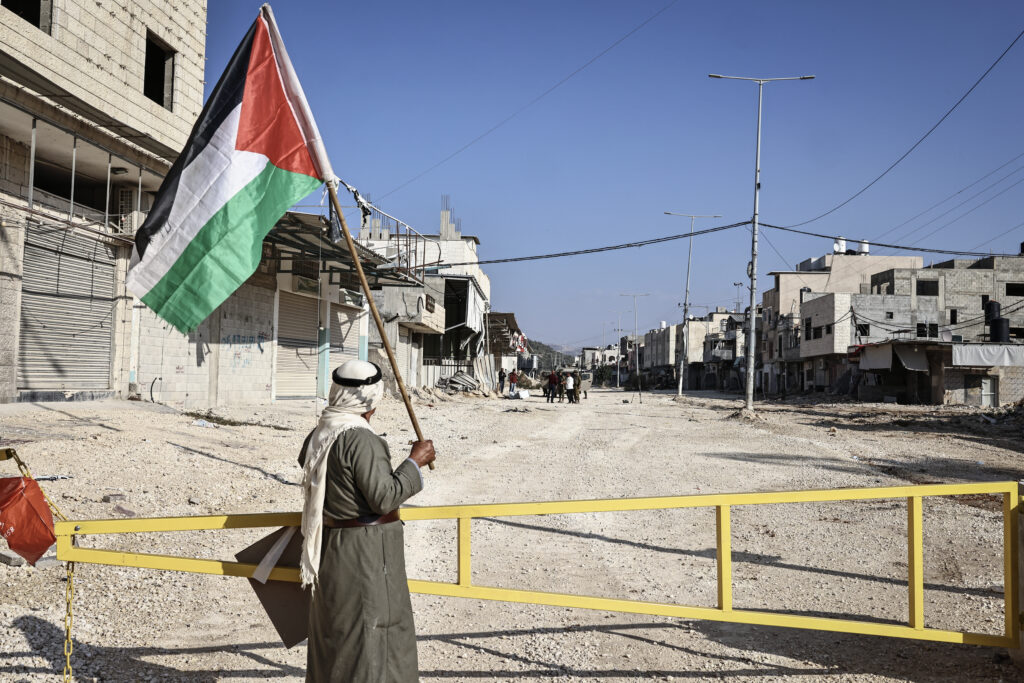AFP Asia Business
Iranian director Jafar Panahi ramps up French Oscars campaign
After years of being banned from leaving Iran, filmmaker Jafar Panahi is enjoying his tour of the United States — visiting Los Angeles, New York and Telluride — as he promotes his Oscar-hopeful “It Was Just an Accident.” The film, which won the Palme d’Or at Cannes, has been selected by France as its official nomination for the Academy Awards, and is widely expected to make the shortlist for the Best International Feature at the gala event in March.”It Was Just an Accident” tells the story of a torturer from the Islamic Republic who finds himself in the hands of his former prisoners — who were jailed for protesting for women’s rights and fair wages — and their struggle to decide whether to exact revenge or to take the moral high ground.Made clandestinely, filming was halted by the Iranian police at one point, and had to be hastily completed.The fact that post-production was done by a French company allowed France to effectively claim Panahi’s film as its own in the Oscar race, under rules set by the Academy.But Panahi, 65, says he would like to see those rules changed to allow dissidents like him who are censored by Tehran to represent their homeland. “I really wanted it to be for my own country, but when an oppressed society exists, well, some difficulties do arise,” he told AFP during an interview in Los Angeles.The complaint is not new. While film festivals in Cannes, Venice, and Berlin make their own choices for films from around the world, the Oscars require each country’s authorities to nominate a candidate for the Best International Feature Film award. The system has faced increasing criticism and public protests in recent years, particularly in the face of rising authoritarianism. “This decreases and undermines the independence of filmmakers,” said Panahi, who continues to create, despite having been imprisoned twice, barred from making movies in the country and banned from traveling outside Iran until 2023.- ‘Humanist cinema’ that resonates -“Iranian cinema is humanist cinema, and it has always been able to resonate with audiences around the world,” he said, recalling the Oscars awarded to Asghar Farhadi’s “A Separation” and “The Salesman,” as well as the international success of Abbas Kiarostami, who won the Palme d’Or in 1997 for “Taste of Cherry.” Iranian greats have managed to navigate the system, despite pressure from Tehran, but artists fear the atmosphere in the Islamic Republic is increasingly hostile.They say authorities have continued to tighten their grip in the wake of the 2022 popular uprising — despite some continued defiance — sparked by the death in custody of Mahsa Amini, who was arrested for her refusal to wear a headscarf in the approved manner. Last year, director Mohammad Rasoulof went into exile to escape flogging and an eight-year prison sentence after filming “The Seed of the Sacred Fig,” which became Germany’s submission for the Oscars last year.Rasoulof and Panahi were arrested together in 2010 when they were working on a film. Panahi went to prison for 3 months then, and for seven months after a 2022 arrest.Panahi has since honed his techniques for shooting in secret. A significant portion of the plot of “It Was Just an Accident” unfolds in a van, which also served as a hideout. Outdoor scenes were filmed in deserted areas and quiet neighborhoods.”When you live somewhere, because you are in the heart of it, you can find the ways to escape,” he said.The film was partially inspired by Panahi’s own time behind bars. His camera follows the heated debates of ordinary Iranians, who shared the same prison interrogator, over what fate they want for their former jailer, who has been kidnapped by a garage owner.Should they kill him to avenge the humiliations they suffered, or refuse to stoop to their torturer’s level? Through this tormentor, the director sketches an Iran where the mullahs’ power is crumbling, and where this moral dilemma could soon become a collective one. The film, he says, is not just about what happens in the present.”You think about people who are going to live in that country later on, and you think about how you must plant the seeds to overcome violence.”
Israel launches fresh strikes on Gaza as Qatar fears for truce
Gaza health authorities said fresh Israeli air strikes killed five people on Thursday, as ceasefire mediator Qatar warned the renewed attacks threatened to undermine the fragile weeks-long truce between Israel and Hamas.The new strikes came the morning after one of the deadliest days in the Gaza Strip since the truce began on October 10, and after Israel launched a series of attacks targeting Hezbollah in Lebanon despite the nearly year-long ceasefire there.Qatar, a key mediator in the Hamas-Israel war, condemned the latest air strikes as “a dangerous escalation that threatens to undermine the ceasefire agreement”.Mahmud Bassal, spokesman for the Gaza civil defence agency, which operates under Hamas authority, told AFP that five people were killed and several wounded Thursday in strikes and artillery shelling east of Khan Yunis in the south.The Nasser hospital in Khan Yunis said three of those killed came from one family, including a one-year-old girl.”We were sleeping peacefully,” said a grieving Sabri Abu Sabt, visibly exhausted after losing his son and grand-daughter. “We are peaceful and we don’t want war.”Tala Abu al-Ala, who lost her sister, told AFP: “Every day there are martyrs. Every day we lose a relative. When will we find relief? Don’t we have the right to live?”Fighting back tears, she added: “I’m afraid I’ll die without achieving any of my life’s dreams.”- ‘Nothing has really changed’ -Israel has carried out repeated strikes against what it says are Hamas targets during the ceasefire, resulting in the death of more than 312 Palestinians, according to the health ministry in Hamas-run Gaza.”We are worried about the war returning,” said Lina Kuraz, 33, from the Tuffah neighbourhood east of Gaza City.”Every time we try to regain hope, the shelling starts again. When will this nightmare end?”Mohammed Hamdouna, who was displaced from northern Gaza to a tent in the south, said “nothing has really changed”.”The intensity of the death toll has decreased, but martyrs and shelling happen every day,” the 36-year-old told AFP. “We are still living in tents. The cities are rubble, the crossings are still closed, and all the basic necessities of life are still lacking.”- Yellow Line -On Wednesday, Israeli strikes killed 14 people in Gaza City and 13 in Khan Yunis, according to the civil defence agency.In Gaza City, Ahlam Halas carried the four-month-old daughter of her nephew, who was among those killed on Wednesday. “He didn’t even get the chance to rejoice in her birth and hear her call him ‘papa’,” she said.Under the US-brokered ceasefire deal, Israeli troops in Gaza have withdrawn behind the so-called Yellow Line.Israeli government spokeswoman Shosh Bedrosian accused Hamas of “continuing to violate the ceasefire”, with “terrorists crossing over the Yellow Line”.”Israel made the decision independently to conduct these air strikes and did not ask for permission to protect ourselves and our people.”An American official told AFP that “the US was notified in advance” of the strikes by Israel.UN chief Antonio Guterres’s spokesman urged all sides to ensure that the ceasefire holds, and called for civilians to be spared from harm.”We are indeed deeply concerned about the Israeli airstrikes that we’ve seen in which civilians were reportedly killed and injured,” Stephane Dujarric told reporters.- Hamas appeals to mediators -Hamas urged US President Donald Trump — who helped broker the ceasefire — and other international mediators to put pressure on Israel to stop its attacks.”This violation requires serious and effective action from the mediators to pressure (Israel) to stop these violations and uphold the ceasefire agreement,” Hazem Qassem, a spokesman for the Islamist movement, told AFP in Gaza City.The war was sparked by Hamas’s October 7, 2023 attack on Israel, which resulted in the deaths of 1,221 people.Israel’s retaliatory assault on Gaza has killed at least 69,546 people, according to figures from the health ministry that the UN considers reliable.Retired brigadier general Eran Ortal, a senior research fellow at the Begin-Sadat Centre for Strategic Studies outside Tel Aviv, told AFP that Israel was “under international pressure” to preserve the ceasefire, with Washington “mobilising the entire region” with a view to striking wider deals.”Therefore, although Hamas has not been disarmed, and there is a strong likelihood that it will also manage to avoid disarmament in the near future, the potential for renewed warfare in Gaza does not appear high.”burs-rjm/jsa
Lebanese army feeling US, Israeli heat over Hezbollah disarmament
Israeli and US pressure on Lebanon’s army to speedily disarm militant group Hezbollah is intensifying, with the army chief cancelling a visit to Washington after officials snubbed him, a military official told AFP.Lebanon’s army has been beefing up its presence in south Lebanon near the Israeli border since a US-brokered ceasefire last November sought to end more than a year of hostilities between Israel and the Iran-backed militant group.Under a government-approved plan, the army is to dismantle Hezbollah military infrastructure south of the Litani river — some 30 kilometres (20 miles) from the border — by the end of the year, before tackling the rest of the country.The military official, requesting anonymity as the matter is sensitive, said “we respect the timeline approved by the government and which the United States and other concerned parties are aware of”.But the official expressed concern that “systematic US and Israeli pressure could pave the way for an escalation of Israeli strikes”, adding that “the demand to disarm Hezbollah across all Lebanon before the end of the year is impossible”.Israel has kept up near-daily attacks on Lebanon and still maintains troops in five areas in south Lebanon.Israel’s military has intensified raids on Lebanon in recent weeks, accusing Hezbollah of rebuilding its military capabilities near the border.The military official said the army was being pressured to search homes in southern Lebanon for Hezbollah weapons or tunnels under houses.The Lebanese army has beefed up troop presence near the border since the truce, with some 9,000 soldiers now deployed there, the official added.- ‘Weak’ -Lebanon’s cash-strapped army, which counts some 80,000 personnel and depends heavily on US aid, is seen as a pillar of stability in the crisis-hit country.President Joseph Aoun served as army chief before being elected as head of state in January with the backing of the international community, and his successor Rodolphe Haykal was scheduled to visit Washington this week.But the trip was called off after US political and military officials cancelled their meetings with him just hours before he was scheduled to depart on Tuesday, the military official told AFP.Those who cancelled included influential Republican Senator Lindsey Graham, who in a statement on X slammed what he said was Haykal’s “weak almost non-existent effort to disarm Hezbollah”.Graham also criticised an army statement that referred to Israel as the “enemy” — a standard term even in official discourse in Lebanon, which has been technically at war with Israel since 1948.The statement in question condemned “the Israeli enemy’s insistence on violating Lebanese sovereignty” and was issued after the United Nations Interim Force in Lebanon (UNIFIL) said Israeli soldiers shot at its peacekeepers on Sunday.Since the ceasefire, UNIFIL said it “has recorded over 7,500 air violations, almost 2,500 ground violations north of the Blue Line, and over 360 left behind weapons caches that were referred” to the Lebanese army.A committee comprising the United States, France, Lebanon, Israel and UNIFIL, holds regular meetings to monitor the ceasefire.Since the truce, the army has been coordinating with the committee and UNIFIL to dismantle Hezbollah infrastructure despite its limited equipment and means, with 12 soldiers killed during such operations in recent months.- House to house -“The Lebanese army is being asked to do what the Israeli army was unable to accomplish during the war with its missiles, aircraft and technology,” the official charged, referring to demands the army search houses in the south, and noting it lacks the personnel and expertise to do so.The army also seeks to avoid civil conflict in Hezbollah’s southern heartland, they added.A promised international donor conference to support the army has not materialised.Hezbollah, which was created after Israel invaded in 1982, is the only group to have kept its weapons since the country’s 1975-1990 civil war, doing so in the name of “resistance” against Israel.The group says it is respecting the ceasefire but has refused to surrender its weapons.An Israeli military official told AFP’s Jerusalem bureau that the ceasefire monitoring mechanism was working but “not as fast as we want, not in the places that we want”.”We see the way that Hezbollah is rebuilding themselves… we don’t let those kinds of threats grow in our backyard,” they added.Hezbollah still has long-range missiles, the Israeli official said, adding that “when we ended the war, we knew that they had between 20 and 30 percent of their fire abilities” left.”You can never do zero… In order to do zero, you need to go house (to) house — every place in Lebanon, which is kind of what we expect the Lebanese army to do, because we can’t do this ourselves,” they added.A Western military source told AFP that “the disarmament of Hezbollah will probably not happen. “Israel believes that after having its arm twisted by Washington over Gaza, it will have a free hand to deal with Hezbollah.”
US honors conservative titan Cheney, with Trump off guest list
Dick Cheney, celebrated as a master Republican strategist but defined by the darkest chapters of America’s “War on Terror,” was honored Thursday in a funeral attended by Washington’s elite that pointedly left out President Donald Trump.Cheney’s career reads like a catalogue of American statecraft, even as his long shadow over foreign policy — as defense secretary during the Gulf War and the 46th vice president under George W. Bush — still divides the country.Bush and fellow former president Joe Biden were among more than 1,000 guests at Washington National Cathedral. But Trump, who hasn’t commented on Cheney’s death, and Vice President JD Vance were not invited.The Neo-Gothic Episcopal church, veiled in muted autumn gloom and fortified by tight security, set a tone of quiet gravity as a Who’s Who of luminaries gathered beneath its vaulted stone arches.”Colleagues from every chapter of his career will tell you that he lifted the standards of those around him, just by being who he was: so focused and so capable,” Bush told the congregation.”In our years in office together — on the quiet days and on the hardest ones — he was everything a president should expect in his second-in-command.”Every living former vice president — Kamala Harris, Mike Pence, Al Gore and Dan Quayle — were in attendance, along with generals, foreign dignitaries and Supreme Court justices.Praised for his intellect and described by historians as the most powerful vice president in modern US history, Cheney was admired as a strategist of unusual clarity, and a steady hand through America’s darkest hours.His career spanned the Cold War, the Gulf conflict and the aftermath of the September 11 attacks.As vice president, he helped drive national security policy and drove an unprecedented expansion of presidential authority.He was said to embody the paradoxes of power: a meticulous operator often thrust into the spotlight, a staunch conservative who backed civil rights for his lesbian daughter and a statesman regarded as both indispensable and dangerous.Cheney’s daughter Liz — famously ousted from the congressional Republican Party over her opposition to Trump — spoke movingly about connecting with her father in his final years, watching sports and old movies, and hitting the road together.”We drove for hours. We talked about life and family history and America,” she said.- Darker legacy -Flags across states were lowered to half-staff after his death on November 3.But looming over every tribute was the darker side of his legacy: the expansion of executive power, the “War on Terror,” the invasion of Iraq and the debate over America’s use of torture.For critics, he was the architect of some of the nation’s most calamitous decisions, a politician whose belief in executive power left deep scars at home and abroad.Cheney was a key advocate for the 2003 invasion of Iraq — famously stating that “there is no doubt that Saddam Hussein now has weapons of mass destruction” — a conviction that haunted him after the intelligence behind the claim unraveled.He championed sweeping surveillance powers under the Patriot Act and defended controversial “enhanced interrogation” techniques.Later in life he emerged as a critic of his own party’s populist drift. A vocal detractor of Trump, whom he called a “threat to our republic,” he even endorsed Harris, the president’s Democratic election rival in 2024.Trump’s absence reflected the ideological rifts that divided Washington during Cheney’s final years, and the demise of the bipartisanship valued by the oldest generation of power-brokers.The president has been silent on Cheney’s death, though his press secretary Karoline Leavitt said Trump was “aware” of his passing.Responding to past criticism, Trump once described Cheney as an “irrelevant RINO” and a “king of endless, nonsensical wars, wasting lives and trillions of dollars.”
Ten months on, displacement feels permanent for West Bank camp residents
Ten months after he was forced out of the occupied West Bank’s Tulkarem refugee camp, Hakam Irhil doesn’t know if he will ever be able to return.Irhil was displaced and his home demolished after Israel launched a major military operation in mid-January in multiple northern Palestinian refugee camps, where the army says it is seeking to root out armed groups.Israel, which has occupied the West Bank since 1967, calls the ongoing operation “Iron Wall”.”Before the operation, in our house — even though it was in the camp — each child had a room. Our life was better,” the 41-year-old father of four told AFP.Irhil now lives in a nearby school, and fears the temporary refuge could well become permanent.The NGO Human Rights Watch warned in a report published Thursday that 32,000 Palestinians remain forcibly displaced due to Iron Wall.- ‘War crimes’ -Over the decades in Tulkarem camp — as with other Palestinian camps — tents gave way to concrete buildings, onto which new generations added floors to accommodate the growing population.But in the last 10 months, the military has demolished more than 850 homes and other buildings across three camps, HRW said, blasting large arteries through the patchwork of alleyways to ease access for military vehicles.The displacement of the camps’ residents, HRW concluded, was carried out through “violations of international law, including war crimes and crimes against humanity”.It added that preventing displaced populations from returning and demolishing homes amounted to ethnic cleansing.In a statement to AFP, the military said the camps in Tulkarem and Jenin had become “terror hubs, where terrorists operated from within civilian neighbourhoods”.It added that there had been “a significant decrease in terrorist activity” as a result of Iron Wall — but declined to say when the operation would end.Irhil’s family is one of 19 now living in the school.”There is no privacy at all. I’m living in a room that’s actually a classroom — me and the five with me,” Irhil said, adding he had put curtains up to give his daughter some space.In the covered outdoor corridors, Irhil and the other families have appropriated the space, setting up planters on ledges, a dish-washing station in a classroom sink, and clotheslines between the columns.- No access -Near Tulkarem city’s other refugee camp, Nur Shams, displaced residents organised a demonstration Monday to demand the right to return home.”We are trying to convey to the army that enough is enough. We are innocent, so why did they expel us from the camp?” said Nur Shams resident Umm Mohammad al-Jammal, who was displaced in February.”This is collective punishment… Why did they do this to us?”Hesitantly, the crowd of about 150 passed the newly-installed gate on the road to the camp, before stopping and chanting at its entrance, an ascending street now littered with rubble from damaged homes.The air was thick with the stench of a decomposing dog, left out to rot with no residents around to remove it.Gunfire rang out from inside the camp, where Israeli troops are stationed, and an Al Jazeera journalist was shot in the leg, sending the crowd running.The army told AFP that demonstrators “violated a closed military zone”, and acknowledged firing at “a key disturber”, accusing him of refusing to comply with soldiers’ commands.Refugee camps were created in the West Bank, Gaza and neighbouring Arab countries after the first Arab-Israeli war for Palestinians who fled or were expelled from what is now Israel at the time of its creation in 1948.The event, known as the Nakba, vividly lives on in Palestinian collective memory, and camp residents like Irhil fear the history of displacement — which many also thought would be temporary in 1948 — will repeat itself.Rumours about possible return dates now circulate among the camp’s residents.”They say ‘in January, you will return’. So in January we prepare ourselves, thinking we’ll return to the camp, return to normal life,” Irhil said.”Then another decision comes — February, March, April…”

